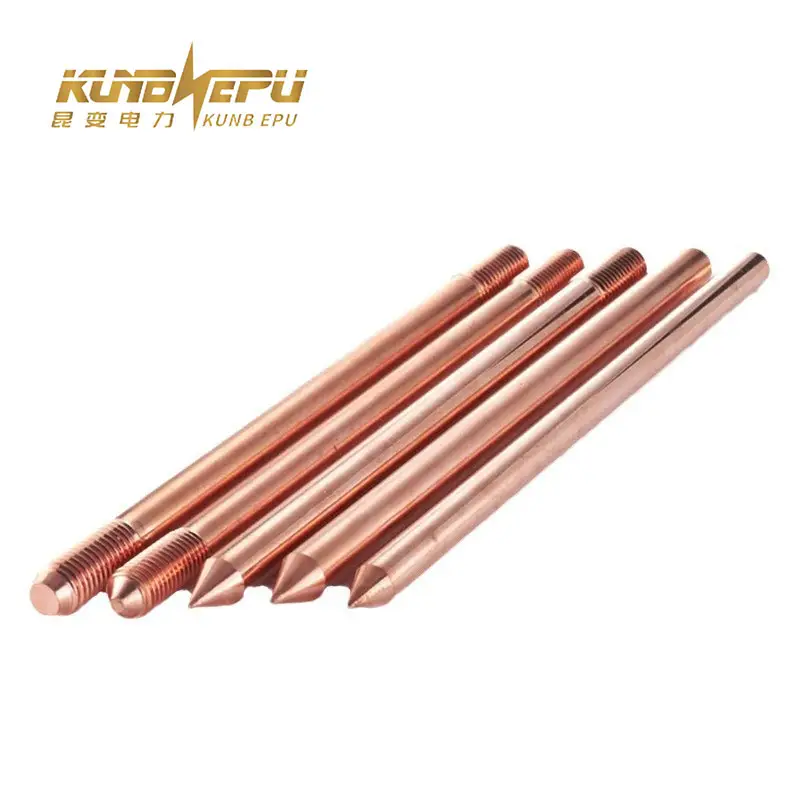Выбор правильного заземляющего стержня важен для безопасности и эффективности электрических систем. В любых электрических работах заземляющие стержни являются важными конструкциями, поскольку они позволяют безопасно отводить избыточную электрическую энергию в землю. В этом посте мы рассмотрим различные типы заземляющих стержней, их назначение и как выбрать подходящий стержень для вашей электрической системы.
Объяснение заземляющих стержней
Также называемые заземляющими электродами, заземляющие стержни - это металлические прутья, которые вбиваются в землю и соединяют электрическое оборудование с землей. Это делается для обеспечения безопасности людей и машин от электрических неисправностей. Заземляющие стержни обычно изготавливаются из меди, оцинкованной стали или нержавеющей стали. Каждый материал имеет свои плюсы и минусы, и мы подробно рассмотрим их в этом разделе.
Типы используемых заземляющих стержней.
На рынке представлено множество типов заземляющих стержней. Некоторые из них:
-
Медные заземляющие стержни эти медные стержни лучше всего использовать для многих типов установок, потому что они обладают как антикоррозийными свойствами, так и отличными уровнями проводимости; они работают лучше в сырых местах.
-
Оцинкованные стальные заземляющие стержни эти стержни покрыты слоем цинка, чтобы предотвратить ржавление и коррозию. Если сравнить их уровни проводимости, эти стержни не так хороши, как медные, но стоят дешевле.
-
Нержавеющие стальные заземляющие стержни нержавеющие стержни, с другой стороны, стоят дороже, но служат дольше благодаря повышенной устойчивости к коррозии, что позволяет устанавливать их в более жестких условиях.
-
Композитные заземляющие стержни эти стержни представляют собой комбинацию различных материалов, чтобы максимизировать их способность проводить электричество и продлить их срок службы благодаря коррозионной стойкости. Они легкие, простые в установке, и поэтому существует множество применений, использующих эти стержни.
Факторы, которые следует учитывать при выборе заземляющего стержня
При выборе заземляющего стержня следует учитывать несколько вещей.
– Условия почвы : Состав почвы может оказать значительное влияние на эффективность заземляющего стержня. Например, если условия почвы песчаные или каменистые, в таких случаях может потребоваться использование более длинных стержней для эффективного заземления.
– Глубина установки : Глубина установки также может быть фактором, влияющим на эффективность стержня. В большинстве случаев заземляющие стержни должны быть вставлены как минимум на восемь футов в землю, однако это может различаться в зависимости от местных норм.
– Электрическая нагрузка : Общая мощность заземляющей системы в значительной степени определит тип и размер необходимого заземляющего стержня. Более тяжелые операции могут потребовать более одного стержня или стержня с большим диаметром.
– Местные нормы : Точно так же, как и на уровне штата/страны, существуют также местные электрические коды и нормы в отношении заземляющих систем и их компонентов, которые могут предписывать, какой тип заземляющего стержня вы должны использовать, и их необходимо соблюдать.
Обслуживание и инспекция
Это довольно замечательный шаг, когда вы вбиваете заземляющий стержень в землю, с этого момента регулярное и систематическое обслуживание, а также проверка системы становятся крайне важными для обеспечения ее эффективности. Со временем даже изолирующий слой, который был целым во время установки, может претерпеть некоторые изменения, и коррозия действительно происходит, что все влияет на эффективность стержня. Такие проверки также гарантируют, что простая проблема не перерастет в более сложную ситуацию, требующую дорогостоящего ремонта или даже замены.
Заключение
Крайне важно для безопасности и эффективности электрических систем выбрать подходящий заземляющий стержень. Это можно сделать легко, изучив различные виды стержней, принимая во внимание тип почвы, на какую глубину его нужно установить, другие требования и нормы конкретной области. Электрические системы меняются каждый день – новые версии, новые типы и т.д. Таким образом, чтобы быть в курсе развития отраслевых тенденций и последних изменений в технологиях заземляющих устройств, что позволит повысить уровень ваших знаний и степень эффективности установки ваших электрических систем.


